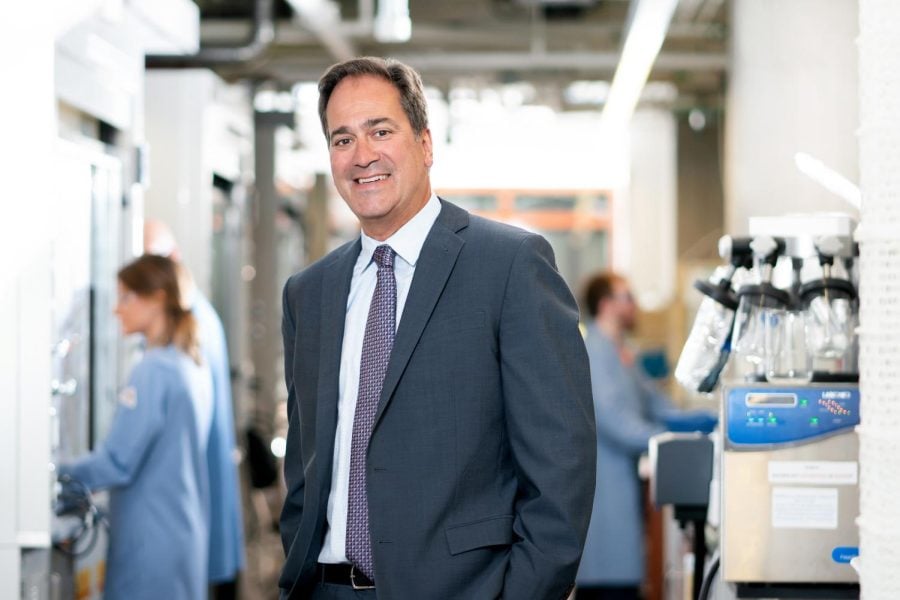‘He’s world class’: Chemistry Prof. Chad Mirkin continues to lead the way in nanotechnology research
Photo courtesy of the Mirkin Research Group
Chemistry Prof. Chad Mirkin leads the Mirkin Research Group, which comprises postdoctoral, graduate and undergraduate researchers.
February 8, 2023
Throughout his 31 years at Northwestern, chemistry Prof. Chad Mirkin has helped propel NU to become a global leader in nanotechnology.
Modern nanotechnology — a field in which individuals study materials smaller than 100 nanometers — is just a 42-year-old industry, according to National Geographic.
“One of the fundamental rules of nanotech is that everything when miniaturized is different,” Mirkin said. “The second part of nanotech is in figuring out what you do with these differences to create new technologies.”
But, Mirkin said he was lucky enough to join NU’s faculty around the time former President Bill Clinton announced the National Nanotechnology Initiative, which initially invested about $450 million in the nanotechnology field in 2001.
Since the initiative, NU has become an international center for nanotechnology research, due in large part to Mirkin’s work as group leader of the Mirkin Research Group.
Mirkin is considered to be the founder of spherical nucleic acids, a gene regulation method that has potential health benefits, such as causing cancer cells to selectively die.
“Everybody in the world who works in nanotechnology follows (Mirkin’s) work,” said chemistry and biomedical engineering Prof. Milan Mrksich, NU’s vice president for research. “As Northwestern has risen from a really good university to one of the world’s top research institutions, (Mirkin) has very much led our way on that trajectory. He’s world class.”
Mirkin has received more than 230 awards for his work and discoveries, including the Friendship Award from China in 2018 and the King Faisal Prize in January. According to Mirkin, the accolades are a source of pride for everyone involved in his research group.
Before achieving “world class” status, Mirkin frequently moved across the globe. As the son of Peace Corps volunteers, Mirkin lived in places like Korea and Malaysia before settling down in Western Pennsylvania for middle and high school.
“(Moving) was an important part of growing up in the sense that it does make you adapt very rapidly,” Mirkin said. “You don’t have time for the world to adapt to you.”
Mirkin said the liberal arts education he received at Dickinson College, where he studied chemistry, allowed him to cultivate close relationships with his professors.
After attending Dickinson, Mirkin earned his Ph.D. in chemistry from Penn State University and then conducted postdoctoral research at Massachusetts Institute of Technology. He then took on a teaching and research position at NU in 1991.
Mirkin said he views NU as the perfect combination of a research “powerhouse” and a smaller-sized school that fosters community between students and professors.
“To this day, I have undergrads that write to me from 25 or 30 years ago, telling me what they’re doing now and how their experiences helped form who they are today,” Mirkin said.
Mirkin said he taught chemistry to mostly freshmen prior to this academic year, which he said he enjoyed because new students are typically enthusiastic and curious. He said he learned something alongside the students each time he taught a class, which encouraged him to change and incorporate new teaching techniques into his curriculum.
Today, Mirkin is focusing on writing a college chemistry textbook that will incorporate modern knowledge on nanotechnology.
“There aren’t a lot of good textbooks that introduce young people to nanotechnology,” Mirkin said. “We’re trying to use a lot of the discoveries that we’ve made at Northwestern and a lot of the lessons we’ve learned to create a way of teaching that hasn’t been done before.”
Both Mrksich and electrical and computer engineering Prof. Ted Sargent have conducted research with Mirkin and described him as a positive presence who is always seeking new perspectives.
Sargent said his group of researchers often work with Mirkin and appreciate his insight as they explore the intersection of nanotechnology and sustainability.
“He’s very energetic and active, full of ideas, full of knowledge based on his experience,” Sargent said. “He’s a very inspiring person.”
Sargent also said Mirkin is an internationally celebrated expert and a pioneer in the fields of nanoscience and nanotechnology.
Despite many achievements, Mirkin said he is most proud of the people he has worked with and trained who have made discoveries and become leaders in the chemistry field.
“No matter what we do, what discovery we make, that ultimately gets dated,” Mirkin said. “The people you train are kind of like your DNA — it’s what’s passed on. If you train them well, which I think we’ve done, they go off and have great careers in their own right, and end up winning big awards and making big discoveries and just keep giving and giving and giving.”
Email: [email protected]
Twitter: @fionaroach03
Related Stories:
— Chemistry Prof Chad Mirkin awarded King Faisal Prize


